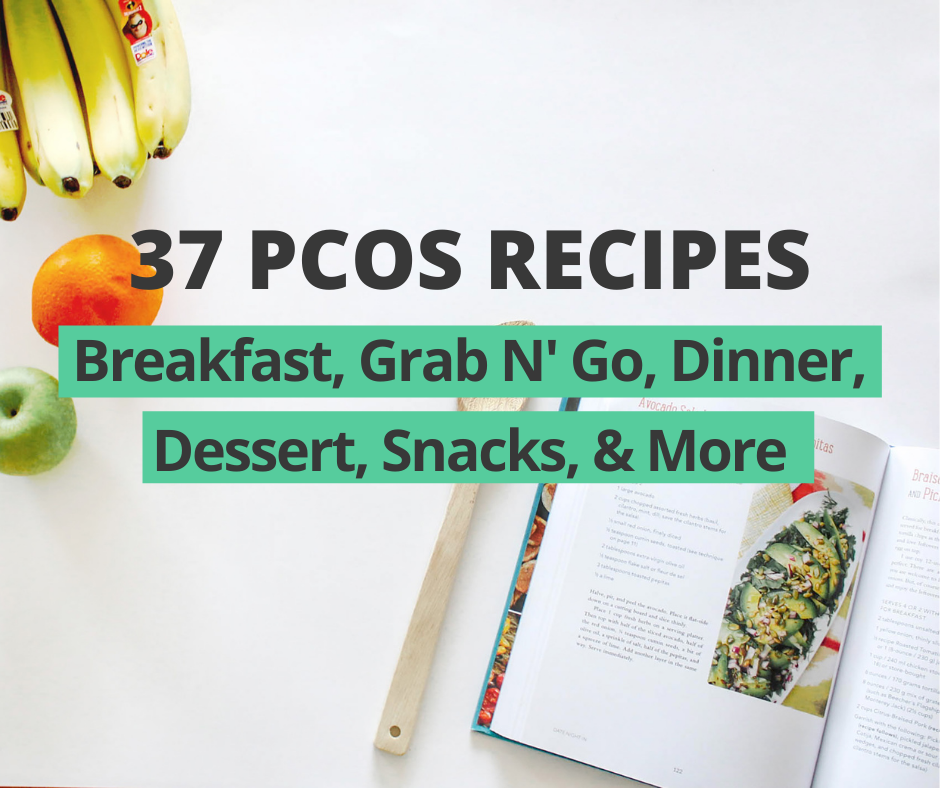[ad_1]
Making the right diet changes for PCOS is easier said than done.
But you’ve just overcome the first challenge. Finding reliable, low-sugar, low-GI, gluten-free, dairy-free recipes.
Scroll down for 37 PCOS-friendly recipes that cover every occasion between breakfast and dessert.
For a full meal plan, download my free 3-Day PCOS Meal Plan here.
Changing your diet is the best way to take back control of your health and fertility. That’s why so many women see improvements within the short duration of my free 30-Day PCOS Diet Challenge.

How Can Diet Treat PCOS Symptoms?
Polycystic ovarian syndrome (PCOS) is diagnosed by meeting two out of the three criteria. Elevated androgen levels, irregular menstrual cycles, and polycystic ovaries. But the most common PCOS symptoms include weight gain, irregular periods, excessive hair growth, hair loss, and acne. Anxiety and depression also often come along for the ride.
These symptoms result from chronic inflammation, insulin resistance, and imbalances in sex hormones [1-3].
The hormone insulin is particularly important in PCOS. One of its many roles is to regulate blood sugar levels. Experts recommend dietary change as a first-line intervention for PCOS because this is the best way to manage blood sugar and insulin levels [4]. Increasing insulin sensitivity reduces the many health risks associated with PCOS.
What’s the Best PCOS Diet?
A PCOS-friendly diet can reduce inflammation, improve gut health, and better manage blood sugars.
Following the right macros for PCOS is a simple place to start. You want to eat nutrient-dense foods that are low in sugar and carbohydrate content. You want to consume adequate protein and plenty of healthy fats.
As explained in my PCOS diet article, most people get it wrong when it comes to what counts as healthy fats. It’s not necessary to only eat lean protein. Fatty cuts of well-raised meat are good for overall health [1, 2].
A healthy PCOS diet always includes plenty of high-fiber foods that have a low glycemic index. These types of foods improve insulin regulation [3-5].
Non-starchy and prebiotic-rich vegetables are also essential. They should be the largest serving in any good PCOS meal plan. These foods provide essential micronutrients that support optimal cellular function. They also nourish the good gut bacteria that create a healthy gut microbiome.
As well as prioritizing healthy whole foods, a PCOS diet reduces systemic inflammation. This is achieved by avoiding gluten, dairy, vegetable oils, and highly processed foods. You can find a more comprehensive list of foods to avoid for PCOS here. I also have a handy foods-to-avoid checklist which you can download here.
I’ve created the PCOS-friendly recipes below in line with these principles.
PCOS Breakfast Recipes
1. Sausage McMuffin
2. Oatmeal
3. Granola Bake
4. Spicy Chicken Breakfast Bake
5. Breakfast Burrito Bowl
6. Pumpkin Pancakes
7. Tex-Mex Breakfast Skillet
8. Chia & Quinoa Parfait
Find more of my free PCOS breakfast recipes here. You can also get access to hundreds of PCOS breakfast recipes by subscribing to my PCOS meal planner.
PCOS Grab-n-Go / Lunch Recipes
1. Swiss Chard Quiche
2. Spinach Chicken Poppers
3. Grab ‘n’ Go Egg Muffins
4. Chicken Collard Wraps
5. Guacamole Chicken Salad
6. Asian Chicken Slaw
7. Sweet Potato Noodle Salad
Find more PCOS lunch ideas here.
PCOS Dinner Recipes
1. Pulled Pork
2. Creamy Tomato Baked Fish
3. Zambreros Burrito Bowl
4. Harvest Chicken Chili
5. Zuppa Toscana
6. Shrimp Fried Rice
7. Slow Cooked Beef and Broccoli
PCOS Snacks
1. Trail Mix
2. Guacamole
3. Zucchini Chips
4. Beef Jerky
For even more PCOS snacks that are quick and easy, go here.
PCOS-Friendly Smoothies
1. Supercharged Green Smoothie
2. Nutty Chai Smoothie
3. Spicy Veggie Smoothie
If you’re into smoothies, I have more PCOS smoothie recipes available here.
PCOS Dessert Recipes
1. Chocolate Mud Cake
2. Banana Bread
3. Berry Delight
4. Ginger Cookies
5. Chai Tea Frozen Yogurt
6. Spiced Nut Muffins
7. Chocolate Chia Pudding
8. Slow-Cooked Brownies
There’s a fair amount of nuance to making healthy PCOS desserts. Understand the key considerations and find other free PCOS dessert recipes here. You can also access hundreds of other PCOS-friendly recipes by subscribing to my meal-planning service.
PCOS Diet Success Stories
There’s a lot of data showing the benefits of a PCOS diet. The right diet can help you lose weight with PCOS. It’s also valuable if you’re trying to get pregnant with PCOS. But sometimes real-life examples are better than numbers. Here are a few so you can see what’s possible.
Start your journey to beat PCOS the same way as Kristin and Jamie. Sign-up here for my free 30-Day PCOS Diet Challenge.
FAQ
What if I’m a terrible cook? Despite being a food blogger, I’m still not much of a cook. I get that it’s important, but I still don’t LOVE it. Given my own limitations, there are plenty of easy PCOS recipes within this list that are well-suited to novice chefs.
Which easy PCOS recipes are also quick to make? If you’re in a rush you’re best off with salads, one-sheet, or one-pot meals. Crockpot meals are also perfect for busy mid-week dinners (provided you’re organized in the morning). Making big batches of food for multiple meals is almost an essential trick for saving time in the kitchen.
Do I need to make everything from scratch? No. There are now many great products catering to PCOS nutritional requirements. A healthy PCOS diet shares elements with other popular diets. For example, foods marketed at the keto diet, Whole-30, and the primal / paleo diet are often suitable for PCOS.
Are these recipes suitable for my family? Absolutely. PCOS recipes are perfect for anyone wanting to eat a healthy whole-food-based diet. Children and active men may need more carbohydrates than those included in my PCOS-friendly meals. But these can be added as sides. Examples include adding extra rice, quinoa, or starchy vegetables.
Do I need to change these recipes during pregnancy? No. These recipes are all well-suited for pregnancy. During the later stages of pregnancy, some doctors may recommend you get more carbohydrates though. This will depend on your personal circumstances.
Do you have any Keto PCOS recipes? Some of the above PCOS recipes are suitable for a keto diet. This is because many of them include meat, fish, or eggs with large servings of non-starchy vegetables. I don’t recommend a keto diet for PCOS though. I explain my recommended macros for PCOS here.
What should I stop eating with PCOS? The most important foods to avoid with PCOS are sugar, sugary carbs, gluten, dairy, vegetable oils, and processed foods.
What are the best foods for PCOS weight loss? Eggs, meat, fish, and seafood are some of the best foods for PCOS weight loss. High-fiber, low-glycemic whole grains, and vegetables are also essential for healthy weight loss. Learn more about how to lose weight with PCOS here.
Should I be restricting calories? No. Despite its popularity for weight loss, caloric restriction is not recommended for women with PCOS. It’s been well documented in the scientific literature that restriction diets are ineffective over the long term [6]. It’s much better to control macros for PCOS, rather than calories.
Does eating more fat make you gain weight? No. In 2010, researchers published a critical assessment of the Dietary Guidelines Advisory Committee (DGAC) report [7]. They concluded that this top US nutritional authority ‘failed to provide sufficient evidence to conclude that decreases in dietary saturated fat, salt, and animal protein lead to positive health outcomes.’
How many meals should you eat with PCOS? Some people recommend that women with PCOS eat three to five times per day to help manage insulin levels. This may be suitable for some people, but others may be best eating fewer and larger meals. The addition of intermittent fasting for PCOS may impact the number of meals per day.
Is snacking okay? Yes. Women with PCOS should follow intuitive eating cues. This means eating when they’re hungry and stopping when they’re full, regardless of other considerations. That said, snacking regularly may show that your main meals are inadequate. Or, other factors, not related to hunger, may need addressing.
Is bacon OK with PCOS? Unless you’re eating a lot of bacon, it’s unlikely to have a clinically significant impact on your PCOS symptoms. That said, it’s best to find bacon products that are gluten and sugar-free. Better yet, try and find bacon that is also free from nitrates, nitrites, and other food additives.
Can women with PCOS eat pasta? Regular pasta contains gluten. This makes it unsuitable for most women with PCOS. Gluten-free pastas are also seldom suitable for PCOS, unless they’re consumed in small quantities. This is because they tend to spike blood sugar levels and disrupt healthy insulin regulation.
Are eggs good for PCOS? Eggs are good for PCOS, and not just egg whites. It used to be believed that eating eggs increased blood cholesterol levels. It’s now well understood that this is wrong [8]. The USDA no longer recommends restricting dietary cholesterol.
What meat should I eat with PCOS? All whole-food sources of meat are suitable for inclusion within a PCOS diet. This includes beef and pork as well as chicken and turkey. Despite others’ advice to only eat lean protein, studies show that beef from well-raised animals is good for overall health [1, 2].
What about fruit? Whole fruit can be consumed in moderation, preferably in the presence of protein and/or fat. The adverse effects of sugar in fruit are offset by the benefits of fiber, phytonutrients, vitamins, and minerals. Learn more about the best and worst fruits for PCOS here.
What about soy? Soy is a nuanced ingredient within a PCOS diet framework. Soy-derived supplements can be good for PCOS. But all foods made from conventionally farmed soybeans should be avoided. Only organic, traditionally prepared soy foods appear to be net beneficial. Learn more about soy and PCOS here.
What about alcohol? From a nutritional perspective, alcohol is best avoided. But it may not be as bad as many sources lead you to believe. For a nuanced understanding of this topic, there are five things you need to know about PCOS and alcohol.
Is coffee bad for PCOS? Pure caffeine, but not caffeinated coffee has an adverse effect on insulin sensitivity [9]. Coffee (and tea) consumption is positively associated with long-term health. This includes type II diabetes [10-12], and heart disease [13, 14]. But it’s also common for women with PCOS to experience hypothalamic-pituitary-adrenal (HPA) axis dysfunction. For these women, consuming caffeinated beverages (even coffee and tea) is likely to do more harm than good.
What about sweeteners? When consumed in moderation, the following sweeteners can be included in a PCOS diet. Raw unpasteurized honey (that is never heated). Glucose-based sweeteners like brown rice or corn syrup. Allulose, xylitol, erythritol. Other sugar replacement products containing monk fruit or stevia extract. Most other non-nutritive sweeteners are best avoided.
What about salt? The risks of too much dietary salt have been talked about for years. Yet studies have also shown that too little salt can lead to increased cardiovascular disease risks. The sweet spot for good health appears to be between 3,000 and 6,000 mg of sodium per day [15]. This is the equivalent of approximately 1.5 to 3 teaspoons.
What are the best teas for PCOS? According to the literature, the best PCOS teas are marjoram tea and spearmint tea. Green tea may also be helpful, although most studies of green tea use concentrated extracts to demonstrate efficacy.
What are the best PCOS supplements? Some dietary supplements can have pharmaceutical-level effects on PCOS. Inositol, berberine, magnesium, and vitamin D stand out as some of the best PCOS supplements.
Author
References
1Provenza, F.D., S.L. Kronberg, and P. Gregorini, Is Grassfed Meat and Dairy Better for Human and Environmental Health? Front Nutr, 2019. 6: p. 26.
2Krusinski, L., et al. Attention to the Details: How Variations in U.S. Grass-Fed Cattle-Feed Supplementation and Finishing Date Influence Human Health. in Frontiers in Sustainable Food Systems. 2022.
3Gołąbek, K.D. and B. Regulska-Ilow, Dietary support in insulin resistance: An overview of current scientific reports. Adv Clin Exp Med, 2019. 28(11): p. 1577-1585.
4Marsh, K. and J. Brand-Miller, The optimal diet for women with polycystic ovary syndrome? Br J Nutr, 2005. 94(2): p. 154-65.
5Weickert, M.O. and A.F.H. Pfeiffer, Impact of Dietary Fiber Consumption on Insulin Resistance and the Prevention of Type 2 Diabetes. J Nutr, 2018. 148(1): p. 7-12.
6Mann, T., et al., Medicare’s search for effective obesity treatments: diets are not the answer. Am Psychol, 2007. 62(3): p. 220-33.
7Hite, A.H., et al., In the face of contradictory evidence: report of the Dietary Guidelines for Americans Committee. Nutrition, 2010. 26(10): p. 915-24.
8Soliman, G.A., Dietary Cholesterol and the Lack of Evidence in Cardiovascular Disease. Nutrients, 2018. 10(6).
9Emami, M.R., et al., Acute effects of caffeine ingestion on glycemic indices: A systematic review and meta-analysis of clinical trials. Complement Ther Med, 2019. 44: p. 282-290.
10Ding, M., et al., Caffeinated and decaffeinated coffee consumption and risk of type 2 diabetes: a systematic review and a dose-response meta-analysis. Diabetes Care, 2014. 37(2): p. 569-86.
11Jiang, X., D. Zhang, and W. Jiang, Coffee and caffeine intake and incidence of type 2 diabetes mellitus: a meta-analysis of prospective studies. Eur J Nutr, 2014. 53(1): p. 25-38.
12Yi, M., et al., Tea Consumption and Health Outcomes: Umbrella Review of Meta-Analyses of Observational Studies in Humans. Mol Nutr Food Res, 2019. 63(16): p. e1900389.
13Crippa, A., et al., Coffee consumption and mortality from all causes, cardiovascular disease, and cancer: a dose-response meta-analysis. Am J Epidemiol, 2014. 180(8): p. 763-75.
14Ding, M., et al., Long-term coffee consumption and risk of cardiovascular disease: a systematic review and a dose-response meta-analysis of prospective cohort studies. Circulation, 2014. 129(6): p. 643-59.
15O’Donnell, M., et al., Urinary sodium and potassium excretion, mortality, and cardiovascular events. N Engl J Med, 2014. 371(7): p. 612-23.
The post 37 PCOS Recipes: Breakfast, Dinner, Grab-n-Go, Dessert, Snack appeared first on Smart Fertility Choices.
[ad_2]
Source link





